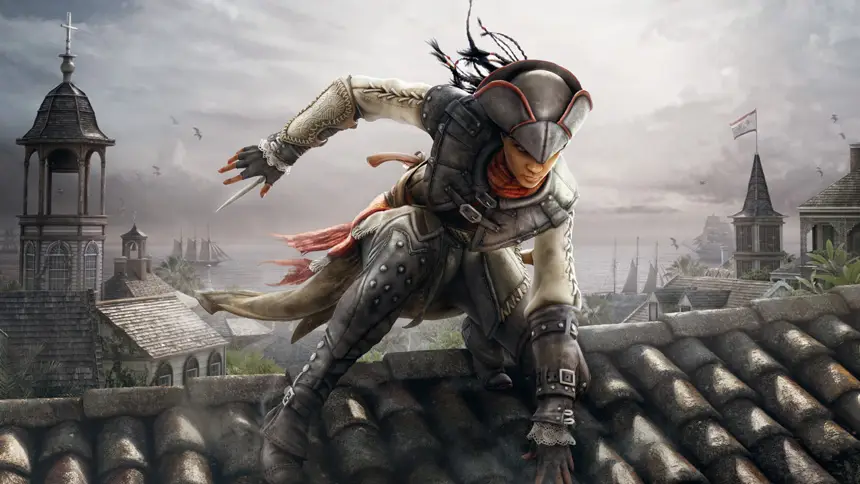
Ubisoft’s Assassin’s Creed series is staged around noteworthy historical time periods, which typically means the series looks beyond American shores. The United States is less than 300 years old, and that doesn’t give us a ton of material to work with. Reportedly, though, Ubisoft wanted to tap into that well once more.
Recent reporting suggests that the French publisher was working on a game that would touch on the Civil War and the Reconstruction era, from the 1860s and 1870s, only to cancel the endeavor due to politics. For some, it’s a disappointing if not spineless move on Ubisoft’s part. I don’t entirely blame the company, though.
As fans know, a handful of existing Assassin’s Creed games are set in America and tackle fraught historical time periods. Assassin’s Creed 3 takes place during the American Revolution, and spinoff Liberation unfolded in New Orleans around the end of the French and Indian War.
Game File’s Stephen Totilo reports that the now-canceled Assassin’s Creed game would have starred a formerly enslaved Black man as he attempts to start a new life. Somehow, he’d get roped into joining the assassins — and take on the KKK. The developers working on it were enthusiastic about it, and hoped that the game could show how racial tensions are used to control populations. But according to multiple sources who spoke to Game File, Ubisoft was uncomfortable with the backlash surrounding Assassin’s Creed Shadows’ Black samurai protagonist and concerned that the current political climate in America was too fraught.
Currently, the U.S. government seems intent on waging war on individual states based on the political allegiance of its respective local leaders — which also makes the topic of secession relevant right now. As ICE spreads its influence through force, racial tensions are at the forefront of public consciousness. Arguably, there’s no better time for a game to explore a post-Civil War era. Despite Ubisoft’s continual assertion that it does not make political games, Assassin’s Creed has already tackled sensitive periods. Liberation, for example, has a Black woman protagonist who explores racial tensions through missions like the ones where players help slaves reach freedom. The storytelling attempts in Liberation weren’t always sophisticated, but to Ubisoft’s credit, most AAA publishers wouldn’t touch similar topics with a 10-foot pole.
Shying away from a Black protagonist in a new game due to recent negative reception isn’t just disappointing, it’s baffling. The thing people had issue with is that a Black protagonist wouldn’t “make sense” in a game set during Japan’s samurai era. Whether you agree with that or not, I don’t think anyone could argue that a Black protagonist from the Civil War era doesn’t fit the theme.
As for the current political tensions, that’s a tougher one. The government has repeatedly shown animosity toward anything that could be interpreted as critical of its policies, and seems intent on shutting down or intimidating sources of dissent within popular media. Recent shootings have also led to increased scrutiny surrounding violent video games, seemingly in an attempt to find a scapegoat. There’s been a concentrated effort to obfuscate the realities of slavery through executive orders that have put museums and national parks under review. The aim is to ensure that these entities promote the correct version of events, according to the current administration. Funding for institutions like the Smithsonian has been threatened over their “divisive” exhibits that have “improper ideology.” All of this has been justified under the banner of “restoring truth in American history.”
A progressive take on the Reconstruction era wherein a Black man kills KKK members would fly in the face of all of that. If people were unreasonable about suspending their disbelief of Assassin’s Creed Shadows, I can only imagine what the reception to a game on the right side of history would be at this particular moment in time, when the world at large is growing more conservative. Late last month, the Trump administration declared an effort to root out domestic terrorism threats, which it defined as anything that’s anti-American, anti-capitalism, anti-Christianity, extremist on race and gender, and in support of overthrowing the American government. A big-budget post-Civil War game would likely tick all the boxes necessary to be deemed terrorist propaganda. Imagine trying to depict Lincoln’s assassination after a real-world attempt on a sitting president, or the assassination of Charlie Kirk. You could play it straight and still end up with controversy.
And maybe that’s what we need right now, bold media that speaks to our times; media that’s willing to take risks. I’m not sure Ubisoft specifically is the ideal torchbearer, given previous storytelling efforts and its general unwillingness to be perceived as too political. You can give Ubisoft kudos for tackling, say, the American Revolution. You could say some of the side missions in that game tackled sensitive subjects in American history with some nuance. It’s also true that Assassin’s Creed 3 did not stick the landing thanks to a number of unresolved narrative beats and rushed storytelling. And when every issue in Assassin’s Creed eventually resolves through combat, there’s a limit to how delicately a product like that can truly capture complex societal constructs. The stakes feel higher for getting the writing right in 2025 than it did in 2012.